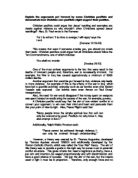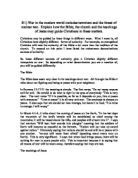Explain the arguments put forward by Christians pacifists and demonstrate how Christian non-pacifists might support their position.
Part B) Explain the arguments put forward by Christians pacifists and demonstrate how Christian non-pacifists might support their position.
In the past there have been many occasions when Christians have fought wars and when Christian countries have fought each other. For example the crusades, the first and second world wars, Vietnam, Korea, Falklands, South Africa and Northern Ireland. Some Christians such as Quakers (The Religious Society of Friends) are totally opposed to fighting and during warfare they are conscientious objectors. They are prepared to go into battle driving ambulances or doing other duties but they will not fight. Other Christians are prepared to fight in the armed services and there are always chaplains attached to military units. Most Christians today probably would not be in agreement with any war that wasn’t fought according to the just war theory. Some Christians believe that they must protest when injustice is taking place against other people, even though they may not be Christians. Another view is that of the present archbishop of Canterbury, Dr Rowan Williams. In 2002 he used his Christmas message to urge the government to pull back from the brink of war. In his statement he attacked the government over its readiness to launch a military attack on Iraq. He warned the world that even “wise men” could “wreak havoc and suffering”. He compared strategists to the three wise men who told king Herod about the birth of Jesus on their way to Bethlehem, prompting a massacre of children. On the anniversary of the September 11th terrorist attacks he described war as “ at best the lesser evil” and added that attacking Saddam Hussein could bring “real cost to our own humanity.” Christian pacifists say that violence is never acceptable and that it breaks the commandments for it says in the bible ”Thou shall not kill.” It is definitely against the Christian idea of love and the thought of Christianity as a kind and caring religion. The early Church was mainly pacifist. Few Christians joined any army until the Emperor Constantine converted to Christianity at the beginning of the 4th Century. Christian Pacifists point to a number of passages in the Gospels to support their views. These gospels encourage behaviour that Christian pacifists would be totally behind and committed to. Jesus himself is often described as a pacifist. He taught, “Blessed are the peacemakers for they will be called the children of God” –Matthew 5:9.Also in the gospel of Matthew, Jesus teaches his followers not to take revenge and to love thy enemies. Chapter 5:38-46 reads,”But no I tell you: do not take revenge on someone who wrongs you. If anyone slaps you on the right cheek, let him slap your left cheek too.” It goes onto say, “ Love your enemies and pray for those who persecute you, so that you may become the children of you’re Father in heaven.” Another example would be Mark 28-34, which reveals, “love your neighbour as yourself” and that this command, “is more important than to offer animals and other sacrifices to God.” Christian pacifists would interpret this as not hurting a fellow human whether in war or any other circumstances.







